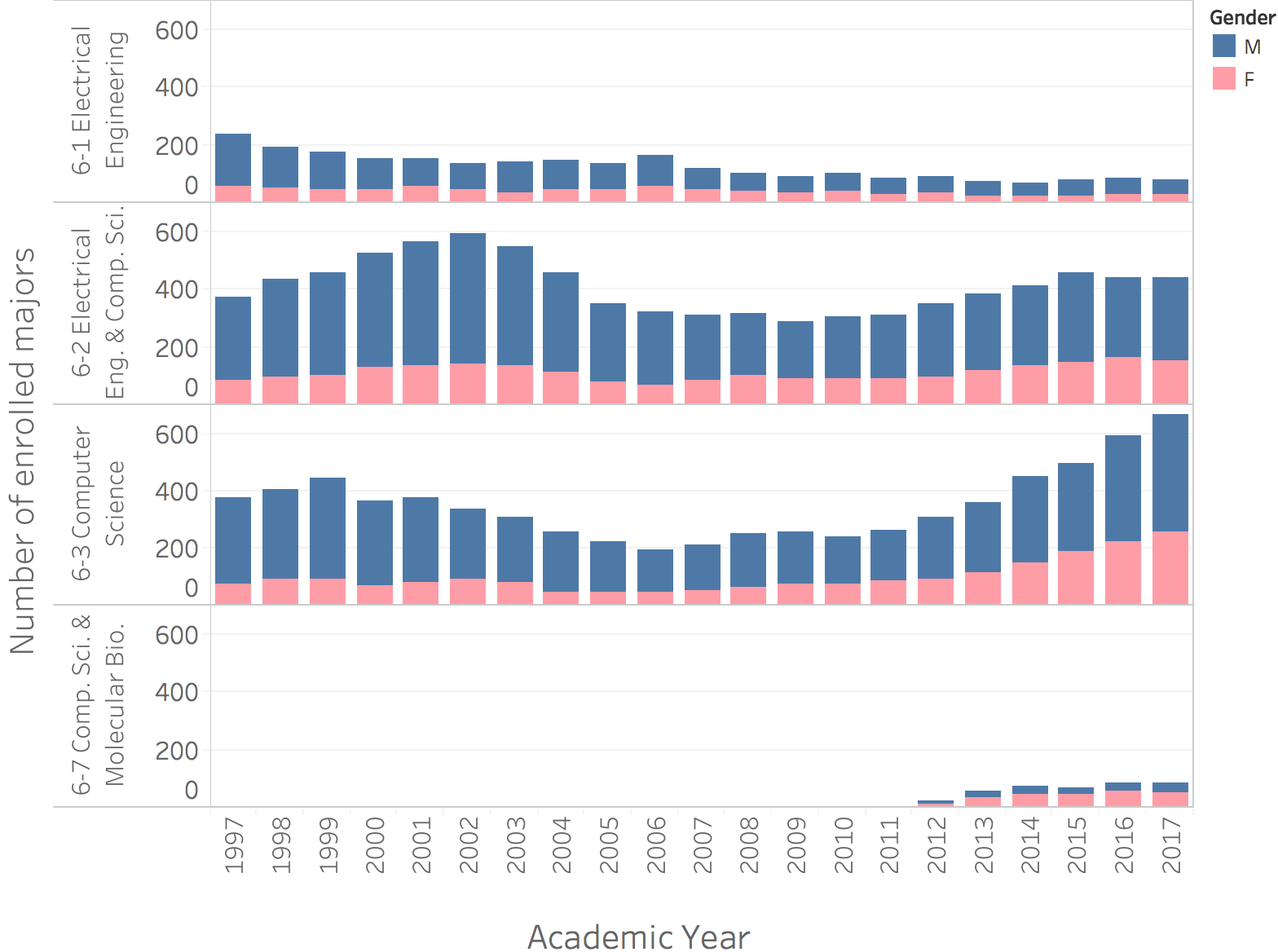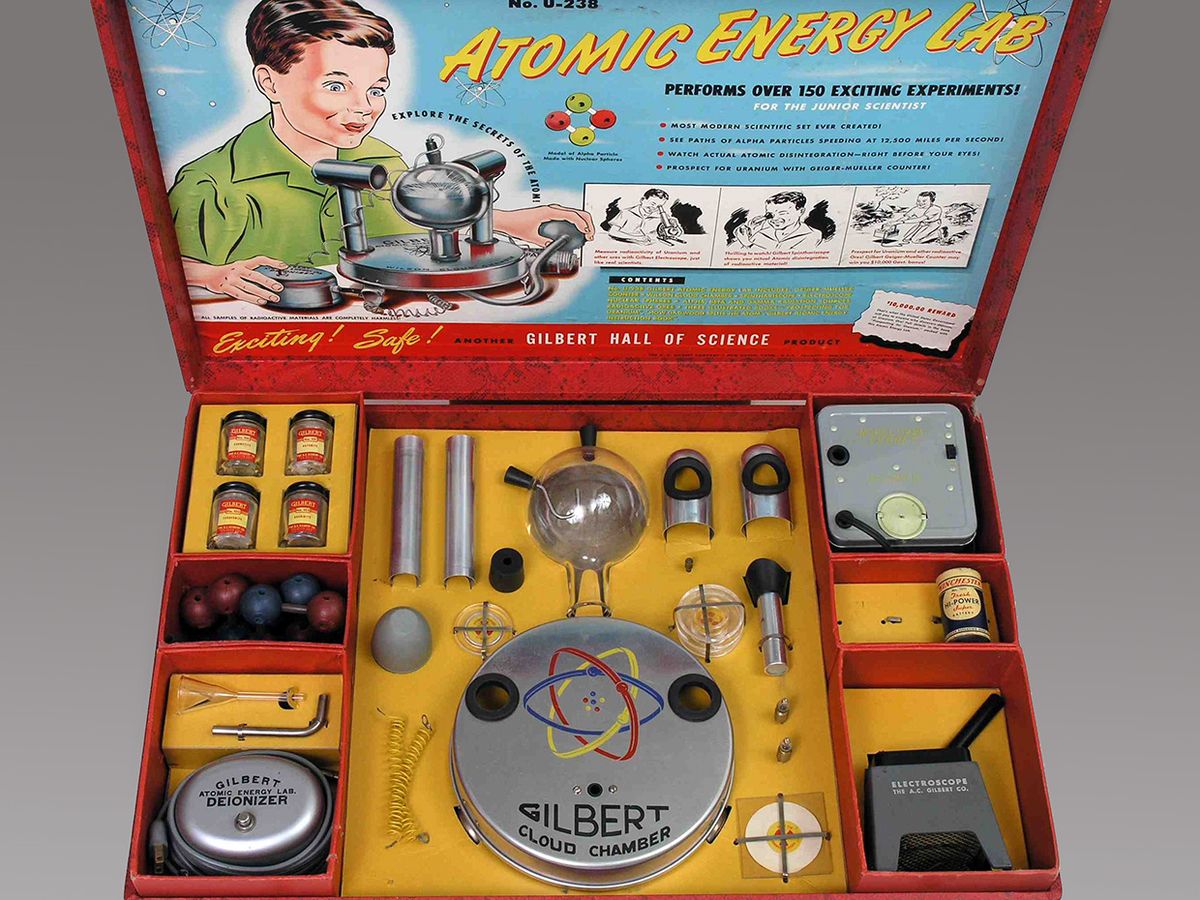Lots more CS than EE, but not 100 to 1.

Posted on 07/19/2022 10:23:31 AM PDT by ShadowAce
Intel has produced some unbelievable graphs in its time: projected Itanium market share, next node power consumption, multicore performance boosts.
The graph the company showed at the latest VLSI Symposium, however, was a real shocker.
While computer science course take-up had gone up by over 90 percent in the past 50 years, electrical engineering (EE) had declined by the same amount. The electronics graduate has become rarer than an Intel-based smartphone.
Engineering degree courses are a lot of work across a lot of disciplines, with electronic engineering being particularly diverse. The theoretical side covers signal, information, semiconductor devices, optical and electromagnetic theory, so your math better be good. There's any amount of building-block knowledge needed, analogue and digital, across the spectrum from millimetric RF to high-energy power engineering. And then you have to know how to apply it all to real-world problems.
This isn't the sort of course you opt to do because you can't think of anything better. You have to want to do it, you have to think you can do it, and do it well enough to make it your career. For that, you need prior exposure. You need to have caught the taste. And to make it your life, there has to be a lot of high-status, high-wage, high-interest jobs to do at the end.
For most of the history of electronics, there was a clear on-ramp for this, and an industry that didn't need to sell itself because it was inherently cool for geeks. Look at the biographies of the great names in electronics, such as Intel co-founder Robert Noyce or the father of the information age Claude Shannon, and you find them as teenage geeks pulling apart, then rebuilding, then designing radios and guitar amplifiers. The post-war generation tore down military surplus gear to teach themselves how it worked and mine components to build their own inventions.
This was practical magic, and you could start your apprenticeship by taking the back off a broken wireless. If you had the urge, it was easy to ignite the fascination. Then came the pull of working on the front line of the Cold War, the space age, the era of technological innovation. The industry had its supply of fresh creativity guaranteed.
This remained broadly true until the turn of the 21st century. A reasonably bright kid would realize that the family CRT television was in fact a particle accelerator with its own multi-kilovolt high-voltage generator, plus any amount of repurposable bits and pieces. You can have a lot of fun with that. There were old analog gadgets all over the place. You could peer inside Granny's radio and follow the signal path, component by component. That's all gone now.
By one measure we're surrounded by more electronics in our homes than entire nations had years back. Your granny's radio had maybe 10 transistors; a smart speaker, billions. But it's a computer, like your flat-screen television is a computer, like your phone and your audio system and even your light bulbs are computers. The electronics have sunk out of sight, beneath thick alluvial layers of software, and it will do nothing without that software. Any budding geek will expend their youthful vigor on that software first, because it's where the animating genius of technology now resides. We have literally cut ourselves off from a primary wellspring of fascination.
It's not all bad news. Maker culture is alive and well and access to knowledge has never been easier. You don't have to go to a library to get out books on electronic theory or find a fascinating gadget to eviscerate. It's all on YouTube. Want to take apart a laser guidance system for an RAF Tornado's bombs? Mike's Electric Stuff has you covered. But the maker culture revolves around embedded processors and high-level concepts: you can build radios at home now that cost a few pounds and outperform the state-of-the-art of a few years back, but they're software defined.
If electronics are invisible at the start of a young engineer's life, they're invisible in the careers they may contemplate. In the 20th century, not only were consumer electronics full of differentiated analog desirables, aerospace, the military, and industry were too. Now everything is a screen with a UI. You still need a lot of specialized hardware, but it's vanished deep into the background. No wonder everyone who once had the itch to solder now gets ensnared by software.
Is it possible for electronics to regain its status as a primary inspiration for young technical minds? Not without a lot of work from the industry that needs those minds. The pipeline it once took as the natural order has broken. To reach new talent, the magic must be re-exposed. What goes on in chip fabs, design bureaus, and product R&D is just as important – and as magical – as ever.
Selling that message in a world designed by geeks to distract geeks is going to be hard. But we have hero brands, and hero space missions, and temples where we conjure machines, atom by atom. If the industry can't look at all the incredible things it does and find a way to capture imaginations, it deserves every last heartbreaking graph of doom. ®
LOL!
I was literally one class away from adding math as a double major. By that time, I was pretty much burnt out on math, and was just trying to get my final CS classes done so I could graduate.
I had an entire class on DiffEQ.
EE is a notoriously hard degree. They all go computer science because you are called an “engineer” even though you really aren’t.
That being said, my youngest daughter got her Engineering Physics degree (summa cum laude), aced all the engineering math and physics courses, but is going computer science/software for her Master’s degree. There is no question she’ll have more options.
Lots more CS than EE, but not 100 to 1.

“EE is a very challenging (hard) major”
It is also more broad in scope than generally understood as there are many EE focus areas that could be departments unto themselves.
Until I was faced with differential equations I naively thought that every math problem had a clearly stated solution.
I got through it, but math and science lost a bit of their luster to me.
As a former EE, now retired, I have an idea as to what may be going on. I struggled to bill just $20/ hr in the nineties when I had my own company. The competition was over the internet with India where they had some very capable guy’s billing less than me. Just about anything I did could be put on the internet and done in India overnight. That happened a lot.
The only place where they can’t replace you easily is in the building industry, the power industry and anyplace in the military/industrial complex as they usually required a security clearance, or they didn’t want any of their blueprints on the internet for security reasons.
One problem is that many colleges refuse to include “for profit” universities in their numbers when they try to report on such things. All universities are for-profit, they just try to claim they are altruistic.
Sadly, I’ll stand by my 1:100 ratio. There simply isn’t much demand for EE students versus CS/IT. A few classes might be EE students with 6-12 students in a class but there would be a hundred classes with 25 CS/IT students.
In the profession, all my EE friends moved to CS over the years. I rarely run into an EE anymore. If I do, they are over 50 and did their EE back in the 70’s or 80’s. When I started college in 79, most EE/CS were in the EE program with CS as a minor. I was doing a double major, and, since CS was not an engineering program, it was allowed. The CS field was still fairly new, and it was popular, but with far fewer students in it.
That’s MIT.
There were also a lot more labs that seemed to last into the night.
Maybe every EE degree should come along with study towards an Electrician's License. That would keep the theoretical types more well-grounded and give students more hands-on experience and an alternate career path if academia or engineering is no longer fulfilling for them.
Maxwell’s equations as we know them are not the ones he described, rather they are the work of Oliver Heaviside who threw out all but 4 of Maxwell’s field equations, converting them to vector equations because field equations, to him, were abominations - from those we learned all we know of the electromagnetic spectrum.
Without Maxwell, both Einstein and Tesla would have remained unknown. Only Tesla tried to explore in a practical way what the original field equations would produce.
I only have two: CS and Physics.
But then you have to lie all day and pretend to be woke. Plus deal with entitled little powder puffs you dare not speak crossly to. Not worth it.
100%
When I was at MIT (Bio major), we ALL had to take two years of Math, including Differential Equations!!!!
And we needed that advanced math for Physical Chemistry (required for Chem and Bio)!!!!
No they are not.
I am an EE/CE and they aren’t the same, despite some of the same base classes in the early years.
It may just be that a smaller number of EEs are needed.

https://spectrum.ieee.org/fun-and-uranium-for-the-whole-family-in-this-1950s-science-kit
Which is what Honorary Serb wanted to know about:
"Course 6 (electrical engineering and computer science) is the largest undergraduate department at MIT.
But I don’t know how many students are in electrical engineering (Course 6-1) vs. the various computer science majors. Does anyone here know?"
Apologies if you were not trying to answer his question.
We need more women in STEM, STAT!
Disclaimer: Opinions posted on Free Republic are those of the individual posters and do not necessarily represent the opinion of Free Republic or its management. All materials posted herein are protected by copyright law and the exemption for fair use of copyrighted works.